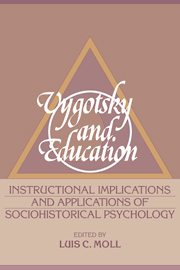Book contents
- Frontmatter
- Contents
- List of contributors
- Preface
- Acknowledgments
- Introduction
- Part I Historical and theoretical issues
- Part II Educational implications
- 7 Teaching mind in society: Teaching, schooling, and literate discourse
- 8 A Vygotskian interpretation of Reading Recovery
- 9 Vygotsky in a whole-language perspective
- 10 The development of scientific concepts and discourse
- Part III Instructional applications
- Name index
- Subject index
10 - The development of scientific concepts and discourse
Published online by Cambridge University Press: 05 June 2012
- Frontmatter
- Contents
- List of contributors
- Preface
- Acknowledgments
- Introduction
- Part I Historical and theoretical issues
- Part II Educational implications
- 7 Teaching mind in society: Teaching, schooling, and literate discourse
- 8 A Vygotskian interpretation of Reading Recovery
- 9 Vygotsky in a whole-language perspective
- 10 The development of scientific concepts and discourse
- Part III Instructional applications
- Name index
- Subject index
Summary
Vygotsky's writings on the development of scientific concepts have important implications for both psychology and education. Although his writing on scientific concepts has not been followed by as much research as some of his other ideas, it constitutes an important part of a central theme in his overall theory. For Vygotsky, the study of cognitive development included investigating the effect of formal school instruction on the development of thinking; he saw instruction as fundamentally different from spontaneous learning in everyday contexts, and he theorized that such experience would have a distinctive and transforming impact on the school child's mental development. In Vygotsky's view, the structure of school learning provides the kind of cultural experience in which the higher psychological processes, such as voluntary attention and logical memory, are formed.
Thus the distinction between spontaneous or everyday concepts and scientific concepts is central to a Vygotskian analysis. A spontaneous concept is purely denotative in the sense of being defined in terms of perceptual or functional or contextual properties of its referent. In contrast, “the relationship [of a scientific concept] to an object is mediated from the start by some other concept. … the very notion of scientific concept implies a certain position in relation to other concepts, i.e., a place within a system of concepts” (1962, p. 93, italics added).
The development of a system of concepts and the mediation of these concepts are seen as involving a kind of learning from which higher psychological functions develop.
- Type
- Chapter
- Information
- Vygotsky and EducationInstructional Implications and Applications of Sociohistorical Psychology, pp. 251 - 268Publisher: Cambridge University PressPrint publication year: 1990
- 13
- Cited by

